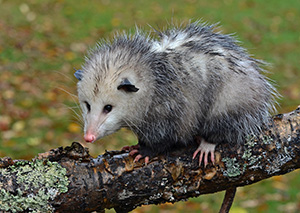Man’s New Best Friend: The Opossum
Man’s New Best Friend: The Opossum
By Claire Long and Bill Willis
June, 2015

Across the United States, states like North Carolina are beginning to report record populations of ticks and tick-borne diseases going into the summer season. However, there is an unexpected ally in the fight: the opossum.
Opossums eat ticks as a regular part of their diet. They’re known to eat just about anything, including snakes, snails, slugs, mice, rats, and carrion, but their appetite for ticks can help keep an area’s tick population firmly in check. Ticks are attracted to warm-blooded mammals like mice and opossums. Mice often remain laden with tick nymphs when ticks land on their bodies. Unlike mice, opossums spend most of their free time grooming, and can detect almost immediately when a tick lands on their body. Opossums will usually ingest the tick before it has a chance to draw blood or move onto another animal or human.
While opossums have a reputation for carrying rabies, this is not the case. Opossums are actually resistant to many diseases, including rabies and Lyme disease. Even if an opossum is bitten by an infected tick, the opossum is not likely to develop, transmit, or act as a carrier for Lyme disease.
Unlike the common mosquito, both male and female ticks feed on mammal blood. Ticks need this blood feast at several different stages of development. Ticks transmit illnesses such as Lyme disease, Rocky Mountain Spotted Fever, and Ehrlichiosis.
Dr. Richard S. Ostfeld of the Cary Institute of Ecosystem Studies located in Millbrook, NY, has found that the primary culprit in the skyrocketing increase in Lyme disease cases is the reduction of biodiversity due to habitat fragmentation and destruction and its impact on the number and composition of host species for ticks. Lyme Disease impacts around 300,000 Americans a year.
NIEHS has several opossums on campus, but they stay pretty much to themselves. If you see an opossum in your yard at home, you may want to consider keeping them around to help you fight the tick population in North Carolina! They’re not considered aggressive and although they may take a fruit or two from your garden, they will help keep down other pests.



